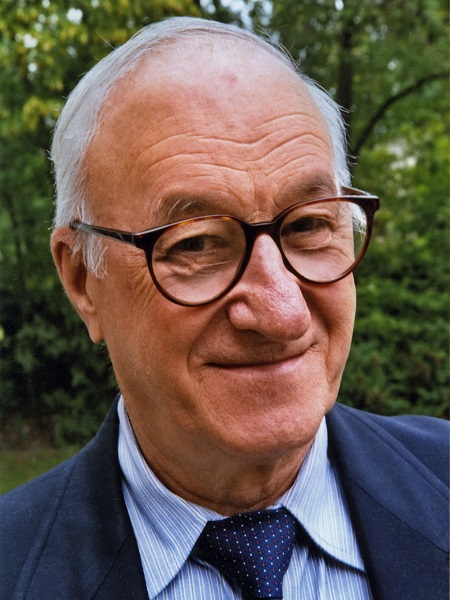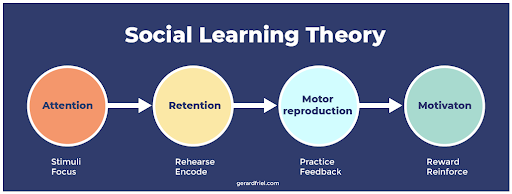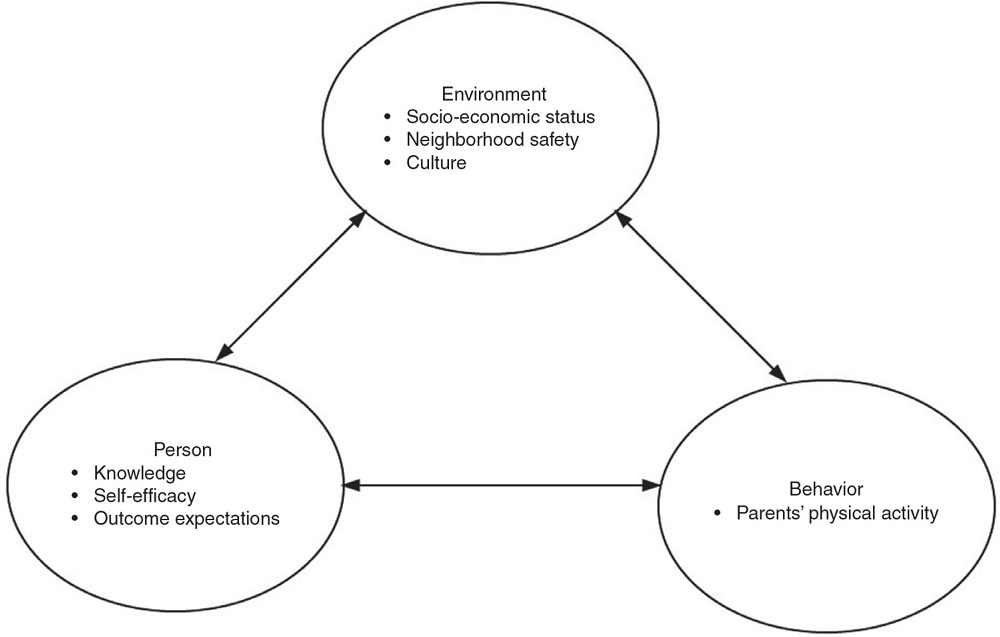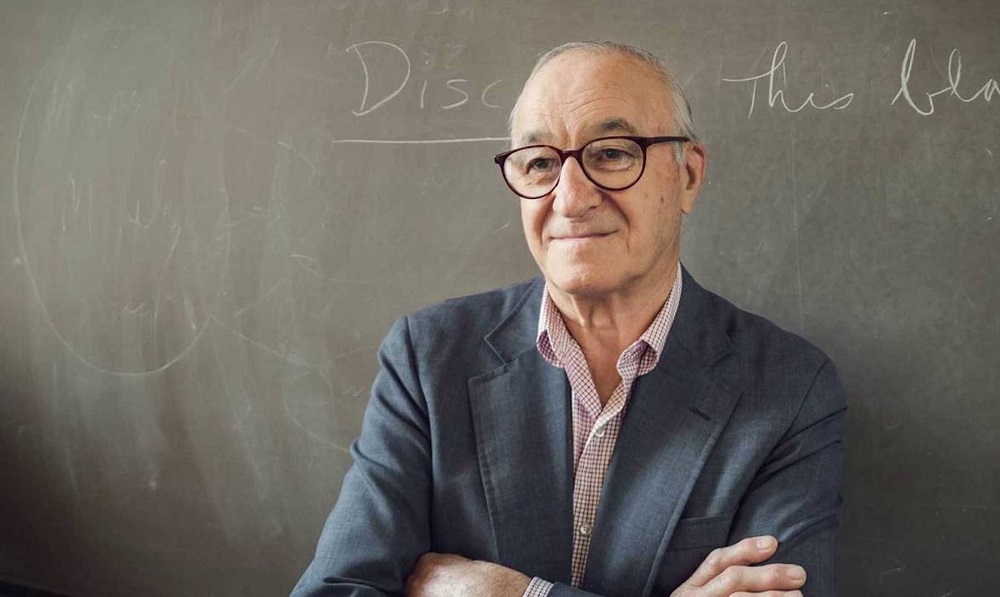Knowledge panel

Full Name: Albert Bandura
Born: December 4, 1925, Mundare, Alberta, Canada
Who is he: Albert Bandura is a Canadian-American psychologist and Professor Emeritus of Social Science in Psychology at Stanford University. A 2002 survey ranked him the most-frequently cited living psychologist and the fourth of all time.
Known for: Developing the social cognitive theory (social learning theory), therapy, and personality psychology.
Bandura is the creator of the Bobo doll experiment (1961) that was the foundation for multiple social learning and behavioral studies.
He is considered the greatest and the most influential living psychologist. His work has been the core for developing psychology branches such as social learning theory, cognitive theory, reciprocal determinism, and cognitive-behavioral psychology.
Famous Quote: “People who have a sense of self-efficacy bounce back from failure; they approach things in terms of how to handle them rather than worrying about what can go wrong.”– Albert Bandura
Rewards:
- he was elected a Fellow of the American Academy of Arts and Sciences in 1980
- he received the Award for Distinguished Scientific Contributions from the American Psychological Association in 1980 for pioneering research in the field of self-regulated learning
- in 2001 he received the Lifetime Achievement Award from the Association for the Advancement of Behavior Therapy
- he is the recipient of the Outstanding Lifetime Contribution to Psychology Award from the American Psychological Association and the Lifetime Achievement Award from the Western Psychological Association
- in 2014, he was made an Officer of the Order of Canada “for his foundational contributions to social psychology, notably for uncovering the influence of observation on human learning and aggression”
- in 2016, he has rewarded the National Medal of Science by President Barack Obama
What is Albert Bandura’s theory?
The most dominant theory that Albert Bandura has developed is the one on Social Learning. It was first named Social Learning Theory (SLT), and later on, it was developed and renamed Social Cognitive Theory.
The theory introduces the importance of observing and modeling other people’s behavior and reactions and highlights the necessity of attention, motivation, and memory, i.e., it puts into light cognitive factors that determine learning processes.
What are Bandura’s 4 principles of social learning?
Albert Bandura’s theory of social learning consists of 4 basic principles:
- Attention – The behavior must grab the learners’ interest. They need to be focused on a task.
- Retention – In order to recall what they learn, the learners need to internalize and realize the information.
- Reproduction – When the information is properly realized and learned, a person can reproduce it without great effort.
- Motivation – Without an inner desire to learn something to imitate others’ behaviors, the learner will remember the information mechanically.
The death of Albert Bandura
Yes, Albert Bandura died on July 28th, 2021, at the age of 95. He passed away while he was sleeping in his Stanford home.
There’s no official confirmation of the exact reason for his death up to now, but one thing is for sure – the entire scientific community was shocked to find out about the death of the founder of this legendary psychologist and the founder of social learning theory.
What was Albert Bandura’s Bobo doll experiment?
The Bobo doll experiment, conducted in 1961 by Albert Bandura, is a classic experiment in the field of social psychology. In this study, Bandura wanted to demonstrate that children can learn social behaviors such as aggression as a result of observing.
In his experiment, researchers abused a clown-faced toy called Bobo physically and verbally while preschool-age children were watching. After the experiment, the children started to learn this aggressive behavior and attached to the doll in the same way.
With this experiment, Bandura proved that children of both genders behaved more aggressively while being exposed to aggressive behaviors. This finding strengthened his social learning theory.
Who Is Albert Bandura and What Is He Know For?
Observing people’s behavior in different social environments is what Albert Bandura got him into psychology.
As he was diving deep into psychology, he found attraction to Robert Sears’s work that focused on familial antecedents of social behavior and identificatory learning.
That led to starting his first major research on human motivation and the role of the social modeling it has on it.
Therefore, together with his first doctoral student at Stanford University, Richard Walters, they started the studies of social learning and aggression.
They demonstrated that the role of social modeling (observing other’s behavior and tendency to imitate it) is critical in developing human behavior.
Their findings led to a research program that established the determining points and mechanisms of observational learning.
From what had then been observational learning, a whole theory was developed later on. Namely, it served as a basis for the Social Learning Theory that showed that children can and do learn through imitation, i.e., social modeling.
Thanks to professor Bandura’s work, we have a more meaningful understanding of human behavior and experience.
He’s had an enormous impact on the advancement of psychology, particularly on positive psychology, with his research on social cognitive theory and self-efficacy.
Social Learning Theory (SCT)
Social Learning Theory focuses on the importance of observing, imitating, and learning from others.
In essence, Bandura proposes that children, in particular, can be greatly affected and influenced on a cognitive level simply by trying to imitate other’s behaviors, emotional reactions, and attitudes.
The theory considers both environmental and cognitive elements as factors that shape people’s learning and behavior.
Bandura supported the existing behaviorist learning theories that proposed classical conditioning (two stimuli linked together create a new, learned response) and operant conditioning (reward and punishment).
However, he added two significant ideas:
- Between stimuli and responses, a mediating process occurs;
-
Through observational learning, children learn behavior.
Observational Learning
The base for this theory comes from Bandura’s renowned Bobo doll experiment (Bandura, 1961) that illustrates how children behave and imitate people around them (so-called models).
These models can be family members, media characters, peers, or any adult that spends more time with children, such as teachers. Bandura made three important points from his research.
First, as the experiment results imply, children are more likely to imitate those individuals that they perceive as similar to themselves.
The second point of the findings is that children are more likely to imitate the same gender behavior, even though it is not imperative.
However, it is the effect of the consequences of the imitated behavior that will encourage children to imitate the behavior or eventually stop it.
When the consequences are rewarding, then it is reinforced. In case children are punished for the behavior, they are likely to end the process.
The process of reinforcement can be positive or negative and external or internal.
External reinforcement is when children seek approval from their environment, while internal reinforcement is when the child feels happy about it. Positive reinforcement will affect if it matches the child’s needs.
Thirdly, when a child decides to model certain behavior, he/she takes into account the consequences that occur to another person.
In other words, if a sibling’s action is rewarded (receives reinforcement) and their behavior is a model that is being copied, then the child (learner) is additionally motivated to copy it as if he/she was rewarded him/herself.
This type of learning through other people is called vicarious learning.
Mediational Processes
Social learning theory focuses on mental (cognitive) factors and their effects on the process of learning, so it is usually considered the bridge between behaviorism and the cognitive approach.
According to Bandura, learners process information, and thanks to the cognitive processes, they see a connection between their behavior and the consequences that arise from it.
It simply means that not every behavior is instantly imitated, but some mental factors influence the response (behavior) before it actually occurs.
Bandura defined four mediational processes:
-
Attention – Learners (children) observe various behaviors, but not all of them get imitated. Therefore it is extremely important for the behavior to grab the learner’s interest.
-
Retention – It refers to the memory the learner has of a specific behavior. Naturally, for certain behavior to be copied, it needs to be adequately remembered, so most behaviors are learned after a specific period of time.
-
Reproduction – It is the physical or mental ability of the learner to reproduce a desirable activity. It might appear attractive to the learner, and he/she might desire to behave in that certain way. However, if the person lacks the skills to reproduce it, then it is less likely to be copied. Think of gymnastics exercises, for instance, and the skills requirements needed for them.
-
Motivation – It is the inner desire or person’s will to copy the behavior. It includes the consideration of rewards and punishments and the implications they’ll have on the learner.
Critical Evaluation
With his Social learning theory, Bandura has shown that mediational processes play a significant role when deciding whether certain behavior will be imitated or not.
His theory has provided significant insight into socially complex and moral behaviors that traditional learning theory could not explain.
However, his theory has been a subject of criticism, as it could find an explanation of how we create deep emotions and thoughts. It failed to recognize the connection between nature and nurture and offer a more extensive insight into a wide range of behaviors.
This led to a modification of the Social learning theory in 1986, and it was called Social Cognitive Theory.
Bobo Doll Experiment
Albert Bandura performed his Bobo doll experiments from 1961 to 1963.
The Bobo doll experiments involved an inflatable Bobo doll (a toy with a mass on the bottom that rocks back when it is knocked down), adults that served as models, and children aged up to 52 months (36 boys and 36 girls) whose behavior was studied.
He performed different variations with the experiments, which all measured how the children reacted after being exposed to different behaviors.
One group of children was exposed to seeing an adult model showing aggressive behavior toward the Bobo doll. Another was a control group. The third group simply watched the adult model playing with the Bobo doll.
The group that witnessed agrеssive behavior included hitting and punching the doll and using abusive and offending language, showed the highest inclination to turn to aggressive behavior themselves after being irritated.
The experiments showed that those children who witnessed aggressive behavior were more likely to show aggressive behavior themselves using the same aggressive words or actions.
Also, the results pointed that children tended to imitate the aggressive behavior of the same-sex models, which proved Bandura’s prediction that children get influenced by people who they find similar, including gender-similar.
Finally, the results pointed that males tend to imitate aggressive behavior more than twice compared to females.
The Bobo doll experiments have shown that behavior is learned by observing and imitating, contrary to behaviorism’s insistence that it depends on rewards or punishments.
None of the children in Bobo doll experiments was positively or negatively reinforced. They were simply trying to imitate what they observed.
Aggression – Classical and Operant Conditioning
Led by his conclusions that originated from the Bobo doll experiment, Bandura offered new views of how behavior is created.
He deemed that classical and operational conditioning inadequate, as the behavioral pattern they proposed was inadequate.
Namely, classical conditioning (Pavlovian conditioning) claimed that two stimuli create a new, learned response.
The typical example is dogs’ drooling every time they hear the bell sound since this sound was what they heard while fed.
John Watson developed the idea that this process explains all aspects of human psychology, i.e., starting from speech to emotions, everything was a stimulus and response system.
None of the psychologists that supported this claim considered cognitive processes.
Another learning theory that existed at the time was the one developed by B.F.Skinner. This learning method focuses on the consequences of a response as a condition of whether a behavior will be maintained or not.
In other words, through operant conditioning, any reinforced (rewarded) behavior is likely to be repeated, while the one that is punished is likely to subdue.
However, in his book Aggression: A Social Learning Analysis (1973), Bandura provides a detailed explanation of why and how mental processes matter and how they shape somebody’s decision to acquire certain behavior.
As he had previously worked on Social Learning Theory and had drawn conclusions from the Bobo doll experiment, the book’s central proposition is that human learning is based on social factors.
By observing social models, individuals (children) activate mental processes that become part of their personalities. Bandura claims that cognitive functions combine with the stimuli and the responses to create complex, authentic behavior.
His views pointed to the fact that TV and media can have an immense influence on how children accept and react to violence and why some children show an extreme tendency to act violently.
Social Cognitive Theory (SCT)
Credit:connect.springerpub.com/content/sgrrtnp/32/1/63
Social Cognitive Theory (1986) can be seen as an upgrade of the Social Learning Theory with some tweaks, some more studies, and some more conclusions.
The central thesis of the SCT is that human learning is a complex, social process, and it represents a connection between the individual, the environment, and the behavior.
In this theory, Bandura emphasizes the individual’s surroundings and internal and external social reinforcement. The SCT considers a person’s past experiences, which influence whether a certain behavior will take place.
These experiences influence the expectations, reinforcements, and mental processes that determine a person’s inclination to engage in a particular behavior.
In his book, Social Foundations of Thought and Action: A Social Cognitive Theory (1986), Bandura redefines individuals as self-regulating, self-reflecting, proactive, and self-organized.
He advances the idea of triadic reciprocal causation, which defines the connection among human behavior, environment, and personal factors (biological, affective, and mental) as interrelated and reciprocal.
The emphasis he put on people’s capacity to self-regulate and self-organize was the foundation for his following work on self-efficacy.
Self-Efficacy
The concept of self-efficacy was first brought to light by Albert Bandura and is defined as a personal judgment of how efficiently a person can overcome obstacles when faced with difficulties or when attempting to achieve goals.
It is the personal belief in gaining success and endurance in a particular situation. Bandura claims that there are four main sources of influence that help people develop their self-efficacy:
-
-
Mastery Experiences (Performance Outcomes) – Mastery experiences are those that people gain when people develop new skills or start a new challenge and how successful they are. The performance outcomes are the most influential as they provide direct insight into how successful a person is when overcoming a challenge.
Failure is the greatest enemy to overcoming obstacles and can greatly impact the process, particularly if the skills haven’t been adequately acquired.
-
Vicarious Experiences (Social Role Models) – It is the situation when people see their role models whom they feel alike succeed in conditions that are similar or related to their own.
This process creates a belief that they too can master their abilities to achieve similar success.
-
Social Persuasion – Any form of encouragement and feedback from a person’s surroundings represents a type of social persuasion.
For instance, if someone tells a child that he/she can achieve anything, they will strive to see how it looks in action.
-
Emotional and Physiological States – Building self-efficiency is much harder when struggling with emotional or physical issues. Therefore, by learning how to manage stress and anxiety, people can learn how to enhance their self-efficacy.
-
Early Life and Education
Albert Bandura was born on December 4, 1925, in Mundare, Alberta, Canada. The town he grew up in had barely 400 inhabitants, with one high school and two teachers.
His hometown’s limited educational opportunities made Bandura independent and highly motivated in his ambition to pursue hard-reaching achievements.
His parents ‘ support was vital in his quest for more knowledge and provided him with moral encouragement to explore opportunities outside the hometown boundaries.
After finishing his high school education, he went to Yukon to protect Alaska Highway against sinking. Witnessing the workers’ subculture of drinking and gambling later sparked his interest in human psychopathology.
However, he enrolled in biological studies at the University of British Columbia, and his interest in psychology was developed by accident. Namely, as he was commuting and arrived earlier, he looked for filler classes to pass the time.
Eventually, he stumbled upon psychology classes that led to finding his permanent interest.
After just three years, in 1949, Bandura earned his degree from the University of British Columbia, winning the Bolocan Award in psychology.
He continued his studies at the University of Iowa which was considered the epicenter of theoretical psychology. Here, he got his M.A in 1951 and Ph.D. in 1952.
Career Path
Credit: https://frasesdelavida.com/frases-de-albert-bandura/
After completing his Ph.D. studies, Bandura completed his postdoctoral studies at the Wichita Guidance Center. Just a year later, he was offered a Stanford University position, and he has kept this position ever since.
In 1974 he was elected the American Psychological Association (APA) president, which is the largest world’s association of its kind.
Bibliography and Writings
Main articles: Social Foundations of Thought and Action and Self-Efficacy (book)
- Bandura, A. (1997). Self-efficacy: the exercise of control. New York: W.H. Freeman.
- Bandura, A. (1986). Social Foundations of Thought and Action: A Social Cognitive Theory. Englewood Cliffs, N.J.: Prentice-Hall.
His other books are:
- Bandura, A., & Walters, R.H. (1959). Adolescent Aggression. Ronald Press: New York.
- Bandura, A. (1962). Social Learning through Imitation. University of Nebraska Press: Lincoln, NE.
- Bandura, A. and Walters, R. H.(1963). Social Learning & Personality Development. Holt, Rinehart & Winston, INC: NJ.
- Bandura, A. (1969). Principles of behavior modification. New York: Holt, Rinehart, and Winston.
- Bandura, A. (1971). Psychological modeling: conflicting theories. Chicago: Aldine·Atherton.
- Bandura, A. (1973). Aggression: a social learning analysis. Englewood Cliffs, N.J.: Prentice-Hall.
- Bandura, A., & Ribes-Inesta, Emilio. (1976). Analysis of Delinquency and Aggression. Lawrence Erlbaum Associates, INC: NJ.
- Bandura, A. (1977). Social Learning Theory. Englewood Cliffs, NJ: Prentice-Hall.
- Bandura, A. (2015). Moral Disengagement: How People Do Harm and Live with Themselves. New York, NY: Worth.
- Bandura, A. (2011). Psychotherapy as a learning process
References and resources:
https://en.wikipedia.org/wiki/Albert_Bandura
https://webspace.ship.edu/cgboer/bandura.html
https://www.britannica.com/biography/Albert-Bandura
https://www.verywellmind.com/albert-bandura-biography-1925-2795537
YOU MAY ALSO LIKE





